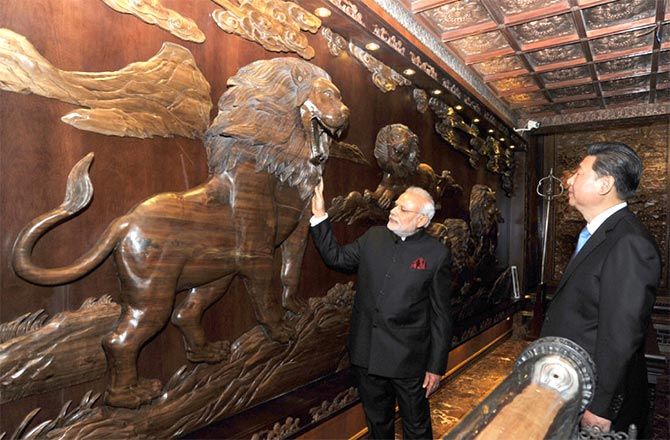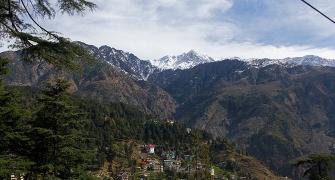 'China's excessive military aid to Pakistan is the real elephant in the room as far as Sino-Indian relations are concerned. India should be confident enough to accept a degree of closeness between China and Pakistan, since China may wish to use this link for its foray into the Muslim world.'
'China's excessive military aid to Pakistan is the real elephant in the room as far as Sino-Indian relations are concerned. India should be confident enough to accept a degree of closeness between China and Pakistan, since China may wish to use this link for its foray into the Muslim world.'
'But the Chinese must be realistic enough to know that as time passes, the tactic of using Pakistan as a proxy to check India will yield diminishing returns. The US tried it for 60 years but failed, so will China,' says Colonel Anil A Athale (retd).
It has become a journalistic ritual to call every visit 'historic' and there is no doubt that Prime Minister Narendra Modi's China visit is being hyped similarly.
This journalistic overkill aside, the China visit could indeed be a turning point in the history of the two nations and the rest of the world if the two leaders manage to 'reset' the relations between the two Asian giants.
The timing for this exercise is important as world events are slowly but surely moving in the direction of making Asia the centre of the world balance of power.
This reset is possible if the two leaders understand that the current debate about ensuring a 'peaceful rise of China' is a Western construct readily absorbed by the 'comprador' elite of the Third World (especially countries like India). The 'real' issue is the relative loss of economic and political (not yet military) power by the West.
Given the violent history of the rise of the West from the 18th century onwards it is very likely that the declining West may lash out and endanger world peace. The real challenge before the two rising powers, India and China, is to ensure that this adjustment of and shift in power balance takes place peacefully. This can only happen if India and China act in concert and are not side tracked by short-term vision.
It is not that there is any 'absolute' decline of the West. What is happening is that with the rise of Asian powers, the difference between the West and the rest is reducing. This translates into loss of power by the West since difference is power! In some sense this could also be seen as the return of the status quo ante as far as the world is concerned. After all, in the long epoch of the history of mankind, spanning over 6,000 years, India and China have been the world's dominant powers.
The Eurocentric world or domination by the West is not more than 300 to 400 years old, beginning in the 17th or 18th century and the industrial revolution. The greatest and longest lasting Western empire, the Roman Empire, barely touched the fringes of India and China.
Of course the modern avatars of this, the British Empire (18th and 19th century) and American one of the 20th century were certainly world-wide and deeply affected Asia including India and China.
That the Western elites remain fascinated by the Roman Empire is evidenced by frequent use of phrases like Pax Britanica/Pax Americana or naming of and modeling modern institutes on Rome (Senates are part of many Western government's apparatus).
There is some degree of urgency lent by the fact that the consumerism of the West or wasteful consumption of resources, is taking a heavy toll on the environment. The lifestyles, defended as 'our way of life' is consuming natural resources and endangering the planet.
On the other hand instead of reforming wasteful ways, pressure is sought to be put on populous countries to curb their minimum consumption in the name of the environment. India and China has to come together if they are to thwart these moves and have some hope of lifting their populations from the miserable levels of consumption of resources.
Unfortunately, there is tendency, especially in India, to harp on the 'border dispute' when it comes to Sino-Indian relations. But India and China are engaged at multiple levels. At the global level there is a convergence/competition on issues of trade, environment and resources utilisation. China perceives India moving closer to US and Japan to surround China. Many in India see the Chinese efforts at securing bases in the Indian Ocean as the 'String of Pearls' strategy to surround India.
At the regional level, China's military support to Pakistan and attempts to secure bases in Sri Lanka and Myanmar are seen as against Indian interests. At the same time, the movement of Indian naval ships into the South China Sea (that China regards as its own 'lake') and close cooperation with Vietnam and South Korea is seen as a move to counter Chinese claims on island territories in the South China Sea.
At the bilateral level, there is the unsettled border issue, a legacy of annexation of Tibet in the 1950s by China. In the late 1950s and 1960, the issue was confined to the northern sector or Aksai Chin areas only. China's claim to Arunachal Pradesh as Southern Tibet is a recent phenomenon (dating back to 2006).
Indians are particularly sensitive to these Chinese moves like issuing stapled visas for Indian citizens from Arunachal Pradesh and Kashmir. The Chinese claim that its stance on Kashmir is a mirror image of Indian support to Tibet. The presence of the Dalai Lama and the provisional government of Tibet in India is seen as a constant irritant.
Trade and economic relations between the two countries have thrived in the recent past. China is India's biggest trading partner today and the issue of trade imbalance, tilted in favour of China, may well put a spoke in the wheel.
Trade is indeed large from the Indian point of view but forms a very small part of China's overall exports. In addition while Chinese exports are mainly finished goods, Indian exports are low value raw materials. For relations to grow this imbalance needs to be addressed by both countries.
The overall picture of relations between the two countries shows that most of the 'heavy lifting' or major concessions would have to be made by China. India has been a unilateral supporter of the one China policy and even at the nadir of relations, never courted Taiwan.
China has over several decades cultivated Pakistan as a proxy to check India. Close to 60 per cent of military hardware of that country is of Chinese origin. Even the two sides approach to territorial integrity of each other is unbalanced. India has always recognised Tibet as a part of China. Our stance has been to urge China to give internal autonomy to Tibet. On the other hand China in the case of Kashmir refuses to accept Indian claims and tacitly supports Pakistan.
What Modi and Xi can do!
Taking the border issue first, it needs to be understood clearly that it is not the 'cause,' but a symptom of lack of trust between the two sides. I have been studying the issue for several decades and tends to agree with the late Professor J K Galbraith's assertion (made during an interview with me in May 2003) that the 1962 India-China conflict was an accidental war. China needs the Aksai Chin area as a strategic link between the restive provinces of Xinjiang and Tibet.
As per the current position of the LAC, this link is secure. The Chinese claims on Arunachal Pradesh and non-acceptance of the watershed principle is a pressure tactic to prevent India's foray into the South China Sea.
But the geo-strategic reality is that China does not have the military capability to annex Arunachal Pradesh even without India raising that utterly futile 'offensive force' in the east. India's 1962 defeat was an aberration and the earliest both countries come out of this syndrome the better. China had a taste of this in 1987 during the Somradong Chu incident when India successfully thwarted a Chinese attempt to grab territory in the Tawang sector.
I have been proposing that India and China can take first step to build confidence by demarcating the border in sectors other than Arunachal Pradesh and Ladakh. A standstill agreement is in force there any way. But to build confidence, India and China must demarcate the border opposite Sikkim, Uttarakhand and Himachal Pradesh. In these areas there is no major dispute about the location of the border. To further build confidence and ease the living condition of people of the region, both should recognise the right of the grazers.
On the Indo-Myanmar border we have an agreement that local tribals can travel some distance in each other's country without a visa. A similar agreement on locals' right to move say up to 10 kilometres in each others area would go a long way in mitigating the hardship of the locals and restore their traditional grazing rights.
Later these measures could be extended to Ladakh and Arunachal Pradesh as well. The border so demarcated should be de-militarised. This is do-able and one of the things that Modi and Xi can easily clinch.
The crux of the border issue is the Tibet question. Some years ago I discussed this with a foreign secretary of the Tibetan government in exile. It seems the Chinese are willing to grant autonomy to Outer Tibet. Tibetan exiles are also ready to give up their demand for independence, which in any case is a pipe dream.
But the sticking point is the status of inner Tibet. The Tibetan exiles are not ready to give up the demand for autonomy of inner Tibet (that is also the Dalai Lama's birth place). My suggestion is that the Tibetans should accept the Chinese offer for Outer Tibet and then work within Chinese system for Inner Tibet.
As China democratises slowly, many of the grievances of Tibetans can be addressed. Tibetans must understand that given the world power equations, this is their best option. Once the issue of Tibet is even partially resolved, the refugees could return to their country. India could play a constructive role in this.
The issue of the bilateral trade imbalance can be solved if the Chinese permit export of IT services from India. A liberal visa regime is must for this. In addition, India and China, as the world's biggest users of the Internet and cyberspace, must jointly develop products and services.
China has taken steps in this regard in terms of starting its own version of Twitter etc. India is still hanging by the coat tails of the West. It is time we in India graduate from being mere Information Technology Enabled Services providers to actually creating information technology products. In short, let us stop being 'cyber coolies.' Besides obvious economic advantages, this cooperation will also boost mutual trust between the two countries.
China's excessive military aid to Pakistan is the real elephant in the room as far as Sino-Indian relations are concerned. India should be confident enough to accept a degree of closeness between China and Pakistan, since China may wish to use this link for its foray into the Muslim world as well as Central Asia. But the Chinese must be realistic enough to know that as time passes, the tactic of using Pakistan as a proxy to check India will yield diminishing returns. The US tried it for 60 years but failed, so will China.
On the other hand India would welcome Chinese influence on Pakistan as a calming factor in that volatile country. While giving dangerous levels of military aid to Pakistan, China should be mindful that besides its anti-India DNA, Pakistan also has ambitions to be a 'Fortress of Islam' and this could create complications for China in Xinjiang. Obviously Chinese assurances on this score will be covert, but India could live with it.
In China, 40 per cent of the population is Buddhist. India should tap the vast tourism potential of this increasingly prosperous segment. Visas on arrival and the development of a Buddhist tourist circuit will not only bring foreign exchange but will also promote people to people contacts between the two countries.
At this time this dimension is totally lacking. There is great hunger for English language education in China. India as the largest English speaking nation could easily tap into this market as well.
At the global level, while India should certainly improve its relations with both Japan and the US but stay away from any kind of 'containment of China' policy. There are huge civilisational linkages between India and China and no people to people animosity. Both Modi and Xi will do well to remember that the 21st century can be the Asian century only if India and China act in concert.
Short term issues should not blur this long term interest and vision.
Image: Prime Minister Narendra Modi and Chinese President Xi Jinping at the Big Wild Goose Pagoda in Xi'an, Shaanxi province, May 14, 2015. Photograph: Press Information Bureau
Colonel Anil A Athale (retd) is a military historian and coordinator of the Pune-based Indian Initiative for Peace, Arms-control & Disarmament.








